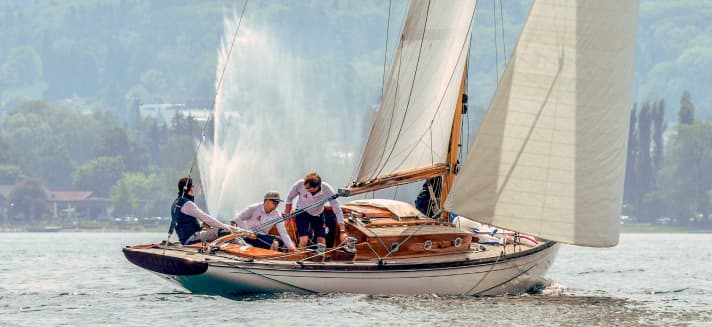Interview about the Lake Constance scene: Commitment to 75 square metres of national cruiser ensures class retention
Lasse Johannsen
· 25.06.2023

The 75 square metre national cruisers have been racing on Lake Constance since the 1913 season, making them the oldest active regatta class in the area. With a hull length of over twelve metres and its enormous sail area, the 75 is the epitome of the large Lake Constance ship. Exactly 17 of the 25 or so ships still in existence can be found here today, 16 of them sailing in top condition, many of them in the second or third generation of the family. A local, very authentic scene that makes little noise and hardly attracts any national attention. One person who knows the boats and their owners better than almost anyone else is Dr Richard Volz. The doctor from Überlingen sails the oldest of the fleet with his "Passat" and initiated the rescue of the "Vinga" from decay and its return to Lake Constance 15 years ago. He is currently involved in two further rescue attempts, and a third is in the pipeline. In this interview, Volz reveals why he is so committed to preserving the ships.
YACHT classic: How did your passion for the 75cc come about?
Richard Volz:(laughs) I was born into it. Our "Passat" has been in the family for almost 60 years now. My father took over the ship in 1965 and restored it in 1973. I wasn't even born then. I grew up on the ship and worked my way through all the regatta positions on board, from forecastle to helmsman.
Today you are the owner ...
Yes, my father handed the ship over to his four children 25 years ago. The siblings gradually got off. I have now been the sole owner for almost 15 years.
The "Passat" was built in 1913 and is the oldest 75-cylinder on Lake Constance, is that why your father bought it?
No, my father bought the sailing school in Meersburg at the time and the ship was there. Its history was unknown for a long time. My father searched in vain for the original sail number for a long time. It wasn't until the internet came along that I found the crucial clue at the Freundeskreis Klassische Yachten, which led me to the archives of the Kiel Yacht Club, which had owned the "Passat" since 1914. Since 2002, I have known her complete history and the original sail number O 4. The ship only came to the lake in the early 1960s.
You are also involved with other 75ers, how did that come about?
Because I was so engrossed in this topic. I then also looked to see what stories could be reconstructed from other ships. This resulted in contacts, including one from Berlin who tried to restore the "Vinga" but failed due to the size of the project.
Today she sails again!
We picked her up from Berlin in 2007, Joachim Landolt restored her at the Michelsen shipyard, she has been sailing again since 2012 and now has a new owner. In the meantime, the next 75, O 34 "Boreas", is awaiting restoration, which is due to begin soon at the glass shipyard in Überlingen.
How many 75s are there on Lake Constance?
There are 17 ships here. With the exception of "Boreas", all of them are in very good to really good condition.
And overall?
A former ship of the Lake Constance fleet is currently sailing in a different area. One sails on the Ammersee and one as a 50-passenger cruiser in northern Germany. Then there are three ships in Holland, one of which, the "Astrea", we are now also bringing to Lake Constance for restoration.

How do you always manage to find new owners for these restoration projects?
We are very active, have six class regattas with an annual ranking and a Far Niente, a joint outing where the focus is on having fun. And we are a very harmonious group.
Since its beginnings here on Lake Constance, the class's activities have only been interrupted during the war years ...
Yes, the 75s have been around on Lake Constance since 1913, and they have always sailed their class regattas, and what has been reported since the 1950s suggests that there has always been a lot of activity in the class.
Was the aforementioned harmony always present?
I can look back to the end of the 1980s. At that time, sporting ambitions were still at the forefront. It was important to be as far ahead as possible and people tried to push the potential of the boats with aluminium masts and Kevlar sails. But it was an active class association with major events. Back then, great importance was attached to etiquette, whereas today things are more casual.
Has the sporting standard changed?
It has shifted a little more towards socialising. Regatta sailing is fun, but a class doesn't live on that alone. And you shouldn't have to constantly talk about rule changes.
Were they ever an issue with the 75s?
There was an exciting phase at the beginning of the 1990s. New 45s were being built, and plans were also drawn up for moulded 75s with round frames and a split lateral plan. That worried us and we asked ourselves what would happen to the old boats?
And what was the solution?
We have revised the construction rules and turned the construction class into a kind of box rule. All existing boats were measured and their minimum and maximum dimensions were defined as limit dimensions. We have boats that are only 11.40 metres long and others that are 12.50 metres long.
So new buildings are allowed?
Yes, but they have to be an S-frame, with a long keel and attached rudder, carvel planked and fit the given dimensions, also in terms of weight.
And have there been any new buildings?
Yes, one, in 1996, the "Artis". A real masterpiece. It's always at the front. But it's not perceived as different, it certainly hasn't harmed the class.

